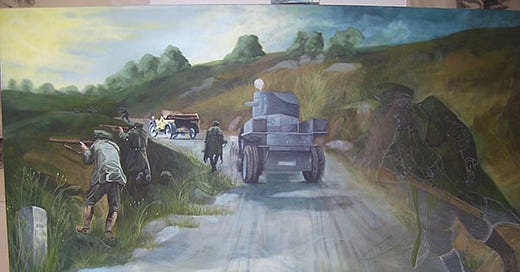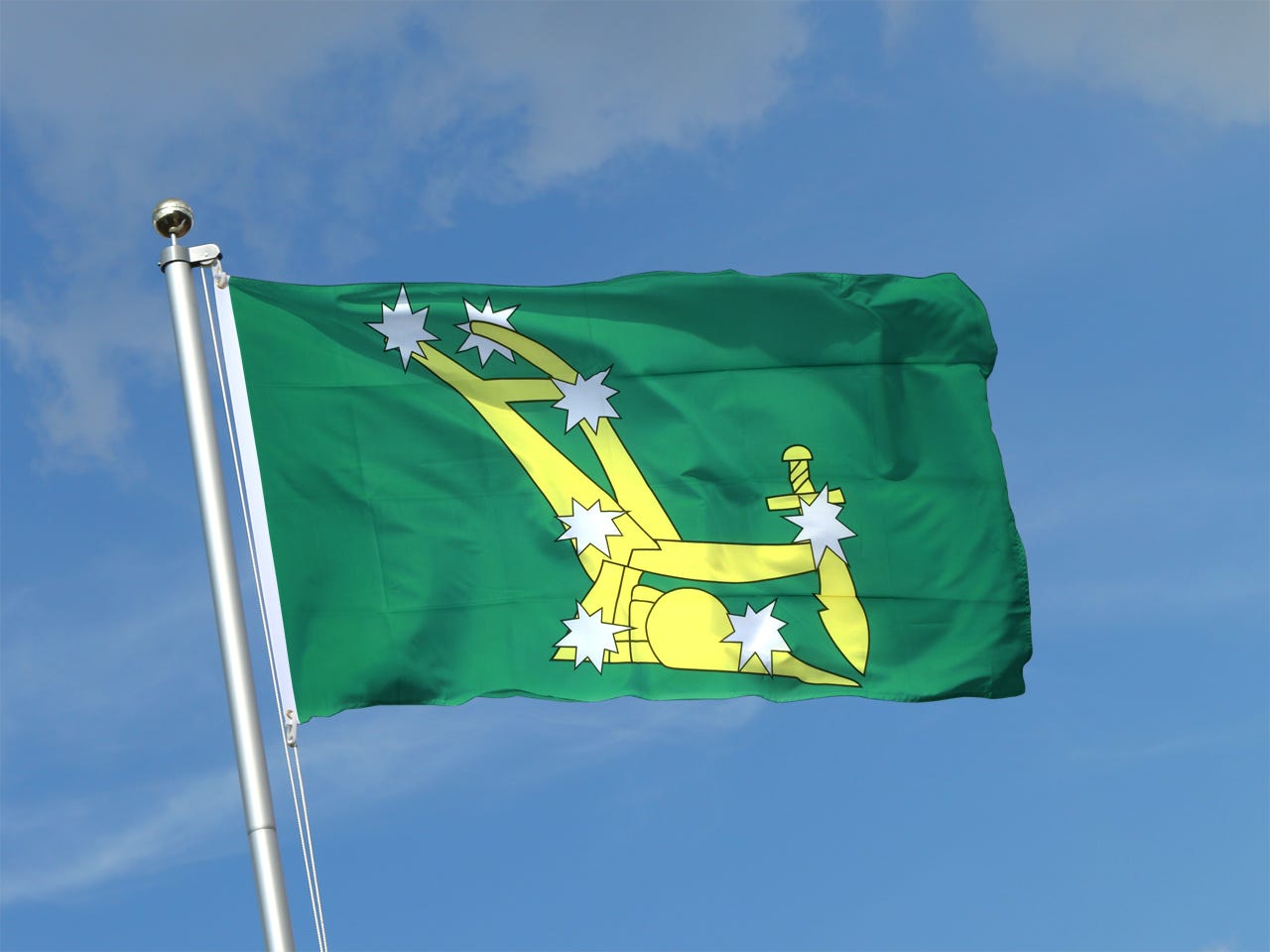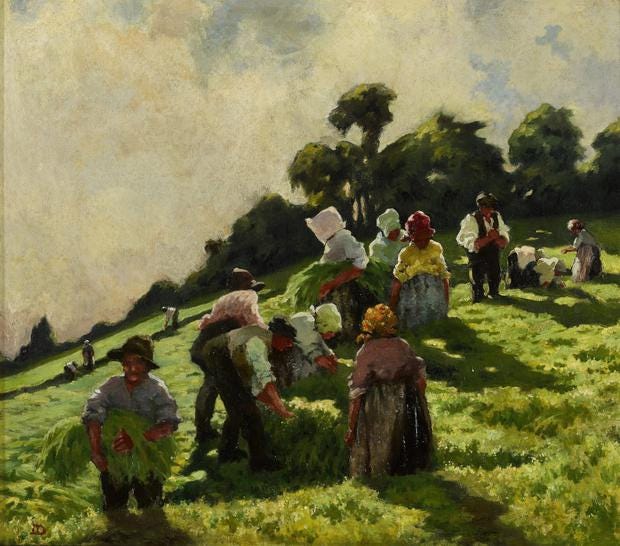'Deserters all!': Michael Collins' Forgotten Programme of National Development
The socio-economic philosophy of Michael Collins is irreconcilable with modern Ireland, contrary to the Neoliberal Establishment's attempt to claim him as their own.
*note: I wrote this article for a different blog back at the centenary of the killing of Michael Collins last August and have now decided to post it here.*
The Legacy of Béal na Bláth
‘He was minister for Finance, and what he had to do was make sure that he raised the money for the new State that had been declared. It kind of proves to me that even revolutionaries need the confidence of the markets™...He understood business.’1
- (Ireland's National Representative of the Gombeen Technocracy on the centenary legacy of Michael Collins's death).
The discussions surrounding last year's centenary of the infamous Béal na Bláth killing in 1922 were almost inevitably going to be sucked dry of any historical value by the stooges of Ireland's cultureless establishment. Yet, Varadkar's highlighting of Collins' economic persuasions unintentionally informs us of the Big Fellow's true legacy. The irony of the mammonist monoculture of corporate Ireland trying to claim a guerrila terrorist who fought and died for the resurrection of his nation bears little repeating.
What is genuinely interesting however, in my view, is precisely how politically homeless the overriding socio- economic worldview of Collins has been through the course of the modern republic. Neither the ‘commercial capitalistic lines of the huge joint stock companies’ of the establishment, or the ‘State Socialism, which has nothing to commend it in a country like Ireland’ of the trotskyists - past and present - were acceptable.
Collins’ Idealism
Instead, the national flourishing of the Irish people — spiritual and social — was put to the forefront:
‘Our object in building up the country economically must not be lost sight of. It is not to show a great national balance-sheet, nor to point to a people producing wealth with the self-obliteration of a hive of bees.
The real riches of the Irish nation will be the men and women of the Irish nation, the extent to which they are rich in body and mind and character.’2
And Ireland full of foreign investment and riches but spiritually dead was no nation worth fighting for. What Collins sought was a country peopled by a bold and large God-following families.
To achieve this goal of national flourishing, a system of protectionist industrial development was required. This was taken from his fellow Free Stater, Arthur Griffith, but coloured by a more radical cultural romanticism and a strident emphasis on monetary sovereignty.
Tim Pat Coogan provides a decent overview of Collins' socioeconomic worldview in his bestselling biography:
‘His philosophy was an extraordinary mixture of Gaelic revivalism, perestroika, the Sinn Fein 'we ourselves' approach and an idiosyncratic common sense. He wanted to restore a "democratic social polity, with the exaltation of the things of the mind and character . . . the essence of ancient Irish civilisation . . . must provide the keynote of the new." The people must become again the "guardians of their law and of their land".' The peculiarly Irish form of democratisation would ensure capital was not "allowed to be an evil". A co-operative system would mean "our countrysides would cease to be the torpid deserts they are now, giving the means of existence and nothing more."’3
Collins' vision is certainly idealistic on the surface. When he speaks of the prosperity of ancient Gaelic civilization one is reminded of Connolly's mythical pre-Norman ‘free clansman owning his tribeland and controlling its administration in common with his fellows’.4
The Industrial Programme
However, there is a concrete industrial plan detailed in the chapter 'Building Up Ireland' in Collins' final collection of speeches and essays, The Path to Freedom. In a Collins Ireland, the state would play a leading role in modernizing transportation, communication and agriculture. As a model, Collins emphasized ‘water power’, arguing he could ‘see in the future very plainly prosperous cities, old and new, fed by the greatest river in the United Kingdom—the Shannon’.5
Interestingly, it was only seven years later that the Free State completed construction of the Shannon hydroelectric scheme in Co. Clare. While the £5 million cost was significant, the fact that the plant produced 80% of the country's energy by the 1930s demonstrated the viability of self-sufficiency and non-reliance on the British economy through targeted state initiatives. The Free State mostly rested on their laurels after this success, hastening to engage in many other ambitious projects, but one wonders what else could have been achieved had Collins lived through this period.
Collins' land reform and agricultural proposals also bear reflection. He proposed 'breaking up the big estates, "the ranches" and studying Denmark's, Holland's, and Germany's farming methods so as to promote agri-business'.6 He urged:
‘land must be freely available. Land is not freely available in Ireland. If land could be obtained more cheaply in town and country the housing problem would not present so acute a problem.’7
Certainly the first few decades of the Free State was marked by a stagnant economy in part due to the underdeveloped and archaic form of agriculture, till the modernising reforms of Sean Lemass in the mid-1950s.
Indeed, Lemass once commented to Collins' nephew, also Michael Collins, that ‘his economic philosophy was derived from a study of The Path to Freedom’.8 One wonders if the ensuing struggle between the Government and Farmers Association, which paved the way for the entry into the European Economic Community, would not have been necessary had Collins modernised the country much earlier.
Similarly, Collins' ‘building up’ prescription for sectors like that of forestry, minerals and marketing appears like a spectre haunting the hollow outline of the early 20th Century Irish economy. It remains unclear whether Collins' state-developmentalist model would have worked at the time, through the Great Depression and Emergency. Still, the contrast between his ambition and the stagnant reaction which had taken place is quite striking.
Financial and Trade Independence
Where these expansive prpgrammes of Collins have mostly been disregarded, his impulse toward financial sovereignty has been wholly ignored. Collins and the early Free State's rejection of a $20 million loan from Wall Street - out of fear of its corrupting influence on independence - has recently been highlighted.9
But beyond that decision, Coogan points out ‘He drew attention to the vast amount of money (£194 million in banks and £14 million post office deposits) "lying idle in banks"’ as well as ‘the huge capital outflows’ from the 1920s Irish economy.10 For Collins, the State should strongly regulate the inflows and outflows of wealth in Ireland. If any Irish-linked Capital attempted to leave, the ‘inevitable tendency will be towards return of this capital to Ireland’, because the risk of Globalizing capital in Ireland was too large:
‘If they do not, investors and exploiters from outside will come in to reap the rich profits which are to be made. And, what is worse still, they will bring with them all the evils that we want to avoid in the new Ireland.’11
On trade and monetary matters, Collins strikes one as a firm economic nationalist. There is a strong emphasis in his writings and speeches that not only should the Irish nation be prioritised over free-floating capital, but that the betterment of the country actually requires a stewardship of finance within the state, away from corruptive globalisation. Irish Capitalism had to be managed, not destroyed.
In terms of Foreign Trade, the State had to start ‘making facilities for the transport and marketing of Irish goods abroad’, as a manufacturing power, and Irish ‘Investors must be urged and encouraged to invest Irish capital in Irish concerns.’12 Collins prefigures here the later 20th Century debate between Republican Sinn Féin, which supported Irish business in the co-operative comhar na gcarmhsan model, and The Worker's Party, which attacked 'the Irish bourgeoisie' and was in favor of American globalisation.
Collins' Organic Socialism
What Collins defended was a rooted form of organic socialism, or Polyani's 'embedded market'. Collins, in so far as he was ideological, was suspicious of American and British finance, seeing globalisation as a threat to the independent nation-state. Hence why, in Collins most extreme expression of anguish and discontentment at De Valera's perceived betrayal - in walking out of the Dáil, instigating the events of the Civil War - the words that came to mind were:
Deserters all to the Irish nation in her hour of trial. We will stand by her!
Foreigners— Americans—English!13
Bibliography:
Collins, Michael and Denis Lenihan. 2010. The Path to Freedom: Speeches. New ed. Dublin: Original Writing.
Coogan, Tim Pat. 2000. The IRA. Rev. and updat ed. London: Harper Collins.
Varadkar on the centenary of the Béal na Bláth shooting.
Collins, p.110.
Coogan, p.422.
Connolly, p.1.
Collins, p.118.
Coogan, p.423.
Collins, p.113.
Coogan, p.422.
Ryan, p.6.
Coogan, p.422.
Collins, p.122.
Collins, p.112.
Dáil Éireann debate - Tuesday, 10 Jan 1922.







